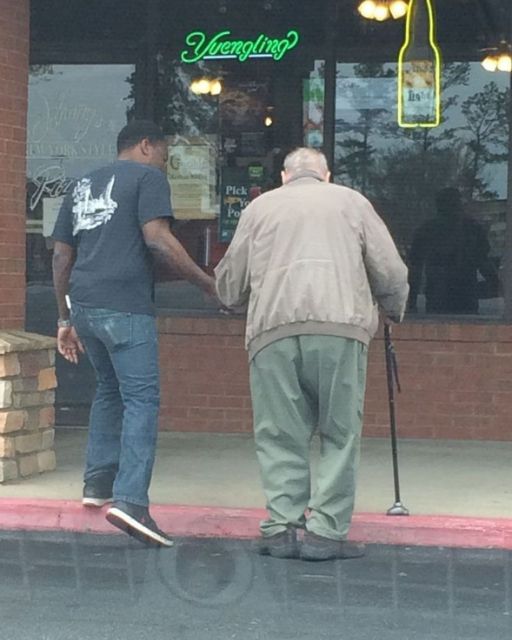What was meant to be a quick, uneventful trip for pizza turned into something far more meaningful. I had just finished a tough shift at work, my hands still greasy and my clothes smelling like engine oil. All I wanted was to grab a large pepperoni pizza and relax on my couch. But life had other plans.
As I pulled into the parking lot of Salerno’s, my favorite small family pizzeria, I noticed an elderly man struggling on the sidewalk. He was probably in his late seventies, using a metal cane that clicked with each step as he slowly tried to climb the curb. His movements were careful and deliberate, and his worn clothes—a faded beige jacket and oversized pants—hung loosely around his thin frame.
People rushed past him, caught up in their own worlds, carrying bags or talking on phones, barely giving him a glance. It was like he was invisible. Something—maybe guilt or a lesson from my parents—made me stop. I rolled down my window and asked, “Need some help?”
He looked surprised but then smiled softly and nodded without saying a word.
I parked and hurried over to offer my arm. His grip was firmer than I expected—strong despite his frailty, as if he was placing trust in a stranger. As we walked slowly toward the restaurant entrance, I noticed his bulky orthopedic shoes—almost exactly like the ones my dad used to wear. That sight brought back a vivid memory of my father struggling quietly in the kitchen, trying not to ask for help.
Inside Salerno’s, the warm smell of garlic and fresh basil welcomed us. The place buzzed with families and laughter. The hostess greeted the man warmly, “Hey, Mr. Benning. Usual table?”
He chuckled, “Not alone today,” then looked at me and asked, “You hungry, son?”
I wasn’t sure what to say. I’d only planned to grab pizza, but his tone suggested this was about more than just food.
We sat in a cozy corner booth. The garlic bread arrived golden and crispy, and I noticed he had already ordered two margherita pizzas, as if he’d known I wouldn’t say no.
“You’re probably wondering why I invited you,” he said quietly. “Ever heard of ‘pay it forward’?”
Of course I had, but hearing it from this gentle stranger made it feel more like a lifelong truth than a passing phrase.
“My son used to say that all the time,” Mr. Benning continued, eyes distant. “He’d help with snow shoveling or fixing things around the house and say, ‘Nah, just pay it forward.’ He worked hard, helped me out, never complained.” His smile was tinged with sadness. “One day, he stopped to help a stranger with a flat tire—and a few days later, he was killed by a drunk driver.”
My heart ached. Words felt useless.
“He believed in paying kindness forward,” Mr. Benning said. “So now, I do the same. Tonight, that was you—helping me get inside.”
I realized then this wasn’t chance. He’d planned this moment. I swallowed the lump in my throat.
After dinner, he walked me to my car and handed me a small envelope. “Here—groceries, gas, whatever you need. Just promise me one thing: pay it forward.”
I wanted to refuse, but he insisted. “No arguments. Just promise.”
The next morning, I thought about Mr. Benning and my dad—two men shaped by quiet strength and pride, rarely asking for help. After years of distance, I called my dad and we talked—nothing earth-shattering, but a start.
Weeks later, back at Salerno’s, the hostess told me Mr. Benning usually came on Tuesdays but hadn’t been in lately. Outside, I helped an older woman with her groceries. She was his friend and ride, and her kind words reminded me that I was part of this ongoing story.
Since then, I’ve tried to pay kindness forward—small gestures, calls home, moments of connection. Then one day, a letter arrived from Mr. Benning, thanking me for reminding him of his son and urging me to keep spreading kindness.
Sometimes, the greatest lessons come from unexpected encounters. For me, it was an old man with a cane and a heart full of hope, who showed me that kindness isn’t just something you do—it’s something you pass on.
So if someone’s kindness ever touches your life, don’t just say thank you. Pay it forward—you never know whose life you might change.
